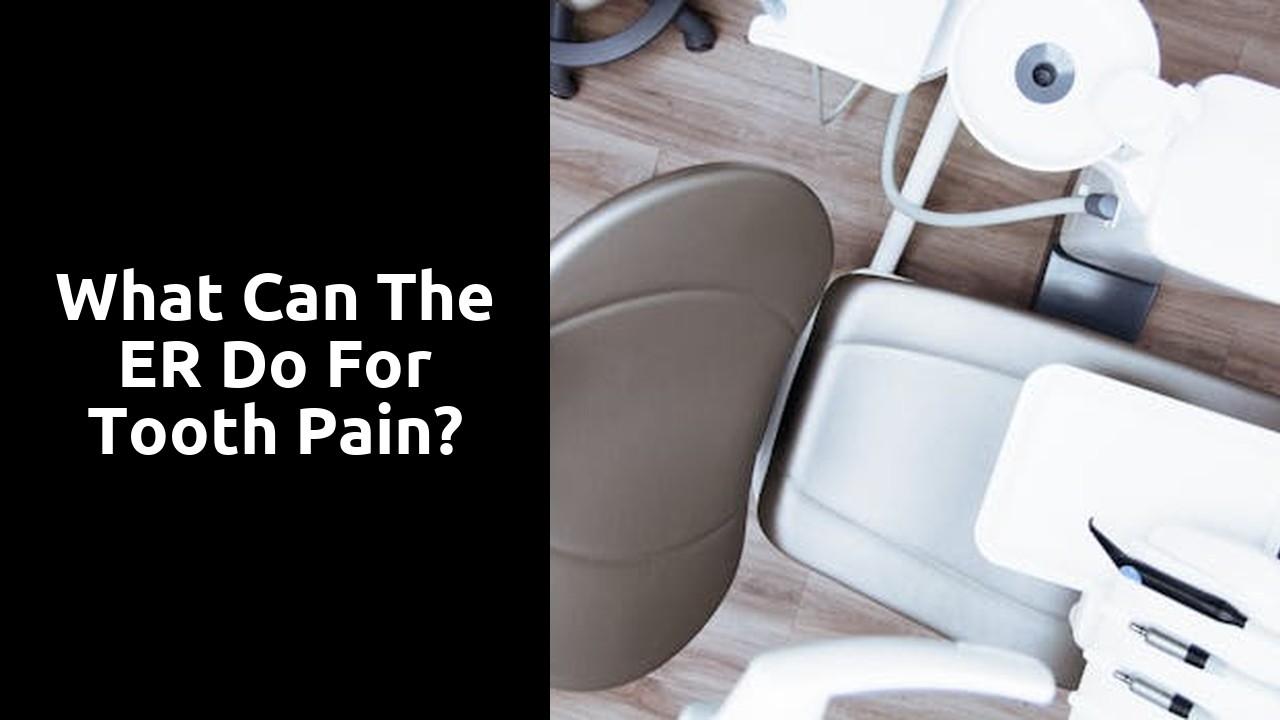What can the ER do for tooth pain?

Preventive Measures for Dental Emergencies
Maintaining good oral hygiene practices is crucial in preventing dental emergencies and tooth pain. Regular brushing and flossing help to remove plaque and food particles that can lead to painful cavities and gum disease. It is recommended to brush your teeth at least twice a day with fluoride toothpaste and floss once a day to keep your teeth and gums healthy.
In addition to proper oral hygiene, it is important to visit your dentist regularly for check-ups and professional cleanings. Your dentist can detect early signs of issues such as cavities, gum disease, or infections, and provide timely treatment to prevent them from escalating into more severe problems. By being proactive about your dental health and maintaining a good relationship with your dentist, you can significantly reduce the risk of experiencing tooth pain and dental emergencies.
Oral Hygiene Practices to Avoid Tooth Pain
Maintaining good oral hygiene is crucial in preventing tooth pain. Brushing your teeth twice a day using fluoride toothpaste helps to remove plaque and prevent tooth decay. It's recommended to use a soft-bristled toothbrush and replace it every three to four months. Flossing daily is also essential to clean between teeth and along the gum line, where a toothbrush may not reach.
Regular dental check-ups are vital to detect any dental issues early on, preventing them from escalating into painful conditions. Professional dental cleanings help remove plaque and tartar buildup, reducing the risk of gum disease and toothaches. Additionally, limiting sugary and acidic foods in your diet can help prevent tooth sensitivity and decay, contributing to overall oral health and reducing the likelihood of experiencing tooth pain.
Recognizing When to Visit the ER
Tooth pain can range from mild discomfort to excruciating agony, and it's crucial to know when a visit to the emergency room is necessary. If you experience severe, unmanageable pain in your teeth or jaw that is not relieved by over-the-counter pain medication, it may be a sign of a serious dental issue that requires immediate attention. Swelling in the mouth or face, especially if it is accompanied by a fever, could indicate an infection that needs urgent medical treatment.
A knocked-out tooth or a broken tooth with a sharp edge that is causing significant pain or bleeding is another reason to seek emergency care. These injuries not only cause discomfort but also expose the inner layers of the tooth to bacteria, increasing the risk of infection. In cases of trauma to the mouth or face that result in severe pain, swelling, or bleeding, it's best to err on the side of caution and seek prompt medical evaluation at the emergency room to prevent further complications or permanent damage.
Signs and Symptoms That Require Immediate Attention
Tooth pain can range from mild discomfort to excruciating agony, and certain signs and symptoms should never be ignored as they may indicate a serious issue that requires immediate attention. One common red flag is persistent and severe pain in the tooth or the surrounding gums, especially if it is accompanied by swelling or a foul taste in the mouth. Additionally, if you experience sudden and intense sensitivity to hot or cold foods and beverages, it could signify an underlying problem that needs urgent evaluation by a dental professional.
Another alarming symptom to watch out for is a visible abscess or pimple-like bump on the gums near the affected tooth. This could indicate a dental infection that has progressed and may lead to further complications if left untreated. Furthermore, any signs of fever, swelling of the face or jaw, difficulty breathing or swallowing, or a strange taste in your mouth alongside persistent tooth pain should prompt an immediate visit to the emergency room for a thorough assessment and appropriate treatment.
Understanding the Role of an Emergency Dentist
Emergency dentists play a crucial role in providing prompt and effective dental care outside of regular clinic hours. These professionals are equipped to handle a wide range of dental emergencies, including severe tooth pain, broken teeth, and infections. When faced with sudden and intense dental issues, seeking help from an emergency dentist can offer the relief and treatment needed to alleviate discomfort and prevent further complications.
Emergency dental care providers are trained to assess and treat urgent dental problems efficiently. They have the necessary skills and tools to address various issues, such as abscesses, injuries, and other conditions that require immediate attention. By seeking assistance from an emergency dentist, individuals can receive timely care and support for their dental emergencies, ensuring that their oral health is managed effectively in critical situations.
Services Offered by Emergency Dental Care Providers
Emergency dental care providers offer a range of services to address urgent dental issues. From treating severe toothaches to handling dental injuries, these professionals are trained to provide immediate assistance in times of need. One of the primary services offered by emergency dental care providers is the management of dental trauma, such as knocked-out or fractured teeth. They can quickly assess the situation and provide appropriate treatment to alleviate pain and prevent further damage.
In addition to managing dental trauma, emergency dental care providers also offer services for various dental infections. Whether it's a severe abscess or an infected tooth, these specialists can provide timely treatment to alleviate pain and prevent the infection from spreading. Moreover, they can also perform emergency tooth extractions if necessary to address severe pain or prevent the spread of infection. Overall, emergency dental care providers play a crucial role in providing immediate care for dental emergencies and ensuring the well-being of patients experiencing urgent dental issues.